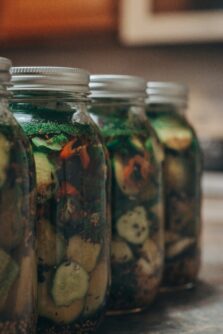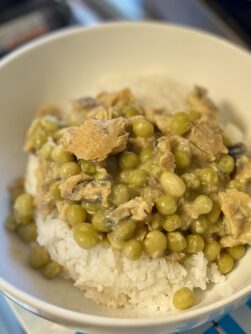Last week, I invited my friend Lisa Garcia, owner of Minimalisanyc in Floral Park, over to help organize my daughter’s room before her college courses begin, a sort of space refresher gift for her, and for me. Garcia is a genius when it comes to decluttering and organizing spaces. While we were talking out some of the common reasons for letting your space, or your entire home, get unruly, disorganized and out of control, the topic of food stockpiling came up. She mentioned that one of the common requests lately from some of her clients has been assistance with pantry control and taming COVID-era food hoarding. I laughed, but yes, yes, I can totally agree with this. Over the past couple of weeks, I have been purging canned food, more than usual, that I attribute to my own survival stockpiling. I thought, wow, this is really a thing.

During a pandemic, the psychology behind hoarding canned food can be traced back to primal instincts rooted in survival and control. As COVID-19 spread across the globe, people were confronted with uncertainty, fear, and the unfamiliar concept of prolonged isolation. These emotions triggered a deep-seated survival mechanism, leading many to stockpile essential items, particularly non-perishable foods like canned goods.
The act of hoarding food during a crisis is not entirely irrational. It is a natural response to the fear of scarcity. In situations where the future is unpredictable, stocking up on food provides a sense of security and control. It assures individuals that they can sustain themselves and their families, even in the face of disruptions to normal life. This behavior is closely linked to the concept of “prepping,” where individuals prepare for worst-case scenarios by accumulating resources. During a pandemic, this behavior is amplified by the constant barrage of media reports about shortages and supply chain disruptions, further fueling the need to hoard.
Psychologically, hoarding canned food can also be seen as a coping mechanism. The pandemic brought about a sense of powerlessness, as individuals were forced to stay home, often with limited information about what was happening in the outside world. In this context, hoarding food became a way to exert some level of control over an uncontrollable situation. It provided a tangible way to respond to the crisis, reducing anxiety and giving individuals a sense of preparedness.
Hoarding can also have negative consequences. For one, it can lead to over-purchasing, resulting in food waste. Canned goods have a long shelf life, but they are not imperishable. If left unused, these items can eventually expire, leading to the very problem that hoarding was meant to avoid—scarcity. Hoarding can create a ripple effect, where the fear of shortages leads to actual shortages, as people buy more than they need, disrupting supply chains and leaving others without access to essential goods.

To avoid these pitfalls, it’s important to approach the use of hoarded canned goods strategically. First, take stock of what you have. Inventory the items in your pantry and assess their expiration dates. Prioritize using the oldest items first to minimize waste. Organize your pantry by grouping similar items together, making it easier to plan meals and reduce the likelihood of forgotten cans languishing at the back of the shelf.
Next, plan your meals around the canned goods you have. Canned vegetables, beans, and meats can be used in a variety of recipes, from soups and stews to casseroles and stir-fries. Get creative with meal planning to incorporate these items into your diet, ensuring that they don’t go to waste. Websites and apps that offer recipe suggestions based on ingredients you have on hand can be particularly useful for this purpose. I personally like to check Allrecipes on the web for recipe ideas with specific ingredients. This week, I simply made canned herring and canned peas in a mustard sauce over white rice, and also fresh Italian sausage with canned asparagus over boxed spaghetti in an olive oil and garlic sauce.



































